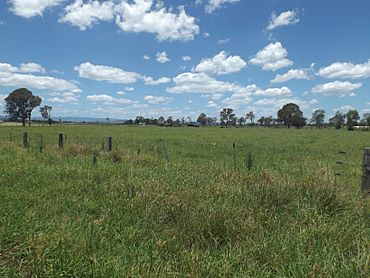Gleneagle, Queensland facts for kids
Quick facts for kids GleneagleScenic Rim Region, Queensland |
|||||||||||||||
|---|---|---|---|---|---|---|---|---|---|---|---|---|---|---|---|

Fields along Alan Creek Road, 2016
|
|||||||||||||||
| Population | 2,106 (2021 census) | ||||||||||||||
| • Density | 67.50/km2 (174.8/sq mi) | ||||||||||||||
| Postcode(s) | 4285 | ||||||||||||||
| Area | 31.2 km2 (12.0 sq mi) | ||||||||||||||
| Time zone | AEST (UTC+10:00) | ||||||||||||||
| Location |
|
||||||||||||||
| LGA(s) | Scenic Rim Region | ||||||||||||||
| State electorate(s) | Scenic Rim | ||||||||||||||
| Federal Division(s) | Wright | ||||||||||||||
|
|||||||||||||||
Gleneagle is a small rural area, also called a locality, located in the Scenic Rim Region of Queensland, Australia. In 2021, about 2,106 people lived in Gleneagle.
Contents
Gleneagle's Location and Landscape
Gleneagle is a place with lots of open land, perfect for farming. The Logan River flows through the eastern part of the area, and the Mount Lindesay Highway also runs nearby. You'll find some farms that use irrigation to grow crops. There's also a housing area built to the east of the highway. In the middle of Gleneagle, there's a big human-made lake called Lake Brabazon. The western edge of Gleneagle follows the Sydney–Brisbane railway line.
A Look Back: Gleneagle's History
How Gleneagle Got Its Name
The name Gleneagle comes from a cotton farm called Glen Eagles. This farm was started in the 1860s by William Tutin Walker. He first worked as a manager on a farm called Townsvale, which was owned by Robert Towns. Robert Towns was one of the first people to grow cotton in the Logan River valley. After Robert Towns passed away, William Walker took over the Townsvale farm.
The Story of St Joseph's Church
St Joseph's Catholic Church was the very first Catholic church in the Logan River valley. It opened in 1876 on a piece of land that was then known as Tullamore Hill. This area is now part of Gleneagle. The land for the church was given by William Rafter, who named his home Tullamore after his hometown in Ireland. For a while, Tullamore was the main town in the area before Beaudesert became bigger.
A cemetery was also started behind the church. In 1889, a special ceremony was held to bless the Catholic cemetery, which is now known as the Gleneagle Catholic Cemetery.
By the early 1950s, the small church was getting old and needed repairs. It also had very few people attending services. There was a much larger Catholic church in Beaudesert by then. So, a decision was made to move St Joseph's Church to the O'Reilly Guesthouse, which was the private home of Bernard O'Reilly. The church was carefully taken apart, moved, and then put back together again. On November 27, 1955, the first church service was held in its new location. Even though it's owned by the O'Reilly family, it's still connected to the Beaudesert Catholic parish.
In 1983, another Catholic cemetery in Waterford West was sold for new buildings. The graves that had headstones were moved and reburied at the Gleneagle Catholic Cemetery.
Schools and Railways
The Gleneagle railway station was part of the Beaudesert railway line, which is no longer used. This railway line opened on May 16, 1888.
Gleneagle Provisional School first opened its doors on March 18, 1891, but it closed around 1899. It reopened in 1902 as Gleneagle Provisional School and then became Gleneagle State School on January 1, 1909.
Another school, Allen's Creek Provisional School, was open from 1927 to 1929. This was a special school for the children of workers who were building the Sydney–Brisbane railway line.
Who Lives in Gleneagle?
In 2021, Gleneagle had a population of 2,106 people. Most people living in Gleneagle were born in Australia (83.5%), and the main language spoken at home is English (91.4%). The most common backgrounds people identified with were Australian, English, and Scottish.
Learning in Gleneagle
Gleneagle State School is a government primary school for students from Prep (the first year of school) to Year 6. It's located at 126-146 Mount Lindesay Highway. In 2017, the school had 211 students.
There isn't a high school in Gleneagle itself. The closest high school for students is Beaudesert State High School, which is in the nearby town of Beaudesert.
Other Places in Gleneagle
The Gleneagle Catholic cemetery is located at 6659 Mount Lindesay Highway. It is managed by the Beaudesert Catholic parish.
 | Jessica Watkins |
 | Robert Henry Lawrence Jr. |
 | Mae Jemison |
 | Sian Proctor |
 | Guion Bluford |


